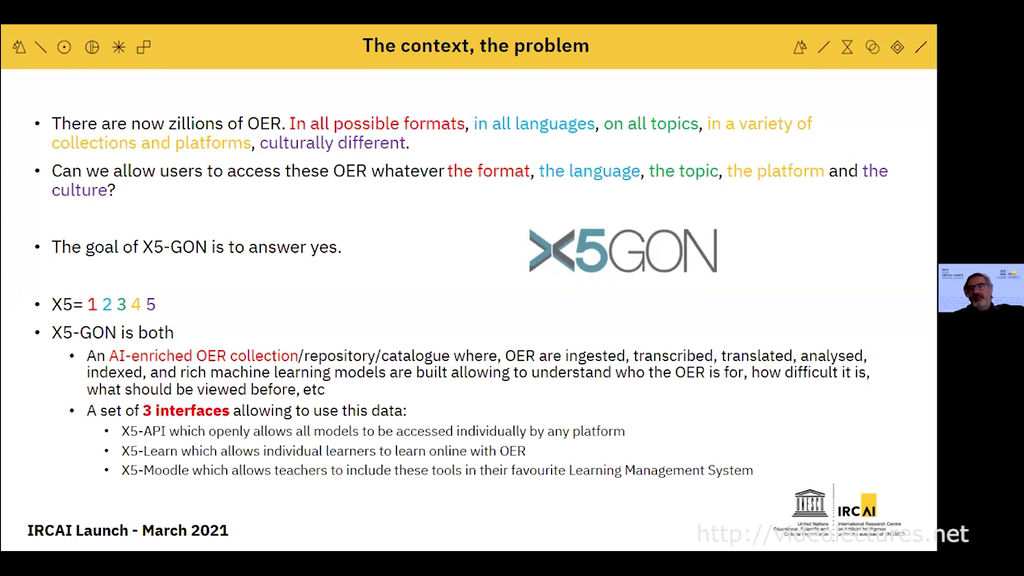X5GON
Cross Modal, Cross Cultural, Cross Lingual, Cross Domain, and Cross Site Global OER Network
Artificial Intelligence and Open Educational Resources
News
The project has developed a commoditized set of tools and systems that enable the ingestion of OER material into the X5GON registry including semantic cross-lingual indexing of materials, automatic transcription and translation of recordings, assessment of how engaging the material is, and potentially how it might sequence with other OERs.
Further, methods for automatically estimating the knowledge of users based on their track record of viewing different OERs enables the system to recommend content that is likely to engage and prove useful for learners and teachers.
For example, a moodle plug-in can provide such recommendations at the level of a particular course, while the X5learn system can make recommendations to individual learners based on their earlier viewing experience.
The project has actively engaged with OER sites and developed systems to assist with the incorporation of OERs into the X5GON registry significantly growing the number of sites and materials that are indexed by the X5gon tools.
The following are the main technological assets the project produced:
| Research and Technology Impact | Main Research and Development products and services |
| X5GON Connect | Service connecting OER repositories across the world into a single network. Within the network, the Connect Service is able to identify how a user is navigating between OERs on the same or across other repositories, thus enabling user pattern analysis. The service is being developed to its full functionality (TRL 9). |
| X5GON Discovery
|
AI-powered search engine [29] that enables learners to discover learning materials. It enables finding OERs by type, license, and language. In addition, the X5GON team partnered with Creative Commons and integrated their Creative Commons Catalog API, thus supporting searching through CC licensed images. The service is being developed to its full functionality (TRL 9). |
| X5GON Recommend | Aligning learning materials with learner context by finding other OERs they are likely to be interested in. The recommendation plugin is a component that allows users to find materials that are related to the OER they are currently observing. The service is being developed to its full functionality (TRL 9). |
| X5GON Feed | Providing quality data to further research in open education. The public X5GON API enables accessing OER metadata, transcriptions and translations, as well as the models and services described above. The service is being developed to its full functionality (TRL 9). |
| X5GON Translate | Providing high-quality automatically generated translations of learning materials beyond borders. This is achieved through the use of the Media Transcriptions and Translation Platform, supporting several languages and focusing the development of high-quality translation models for minority languages. The service is being developed to its full functionality (TRL 9). |
| X5Learn | An intelligent learning platform that bridges the right educational resource to the right user at the right time within a futuristic user interface. The service is being developed to its full functionality (TRL 9). |
| X5GON TrueLearn | A scalable, transparent educational recommender for lifelong learners. The service is being developed to its full functionality (TRL 9). |
| X5GON Moodle | A Moodle plug-in to use X5GON technologies to build learning activities. We are running a Moodle on Posta Slovenija machines with a mock lecture “AI and the climate change”. The service is being developed to its full functionality (TRL 9). |
| X5GON Blind | A prototype learning environment for the blind and visually impaired. The environment leverages existing technologies adapted for the visually-impaired and integrates X5GON TrueLearn to provide recommendations. The service is being developed for system prototype demonstration (TRL 7). |
| X5GON datasets | X5GON has released several datasets that can be used to approach some of the previously mentioned technical challenges. As the project approaches its end more datasets will be released. |
| X5GON Github | The repository including all the public code of the project stating it as “The World’s first ecosystem connecting Open Educational Resource sites for the collective benefit of everyone, everywhere”. |
| X5GON Crawlers | The crawlers we developed are a tailored product for each OER repository, currently used by partners at JSI, NA and outside ventures such as MIT and University Bologna. They systematically browse OER sites as a remedy for no snippet integration to update their web content or indices of others sites’ web content. The service is being developed to its full functionality (TRL 9). |
On 29 March 2021, Borut Pahor, President of the Republic of Slovenia, and Audrey Azoulay, Director-General of UNESCO, inaugurated the International Research Centre on Artificial Intelligence (IRCAI), as a Category 2 centre under the auspices of UNESCO in Ljubljana, Slovenia.
Colin de La Higuera, PC Chair in AI and Education presented the work of the international scientific committee focus on AI algorithms that can make Open Educational Resources more accessible and easier to use, based on X5GON.
We have released all our scientific reports and here we are briefly listing the ones we feel are the most important ones. These combine the work in artificial intelligence and open educational resources:
- Advanced Content Representations
- Evaluation methodologies for content representation models and release of datasets for measuring quality of OERs
- Selected models and content representation models
- Evaluation Report
- X5GON products and services
- Learning Analytics Engine 3.0
- Prototype of recommendation engine
- Prototype of cross-language recommendation engine
- Piloting of use cases
- Study in-the-wild of OER user Experience, Engagement and Enjoyment











